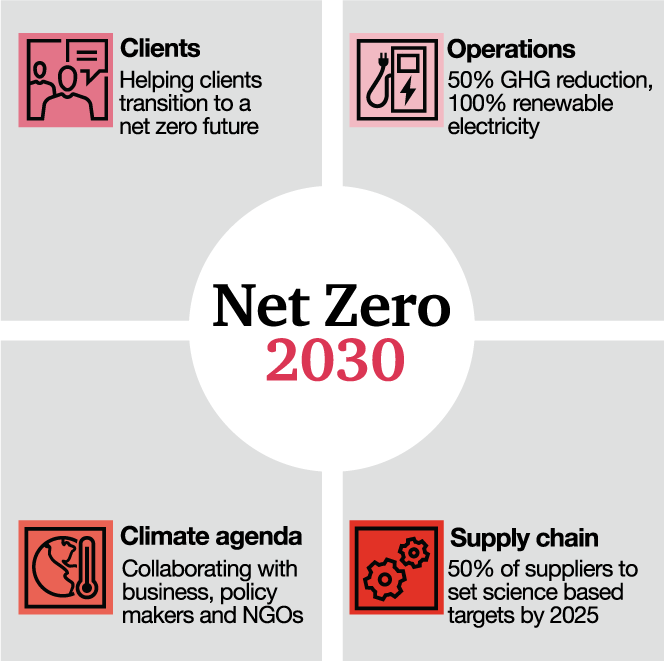Planet

Ambition
Net Zero - Following the global commitment:
- FY25: Transition to 100% renewable electricity. Ensure 50% of our purchased goods and services suppliers have reduced their own climate impact.
- FY30: Reduce absolute CO2 emissions by 50% including business travel. Transitioning our carbon offset portfolio to 100% carbon removals.

Climate change is undeniably the biggest business and social challenge of the current century. The last year has made the effects of the changing climate even more apparent with extreme drought, forest fires and flooding, impacting communities around the Planet.
The business community has a pivotal role to play in making positive change. The PwC global network’s ambitious Net Zero 2030 Commitment requires us to transform our firm’s business model by decarbonising our operations and value chain while also engaging with clients and suppliers to meet these ambitions.
PwC’s Net Zero commitment
The PwC global network aims to reduce gross emissions by 2030 in symmetry with the 1.5-degree climate agreement, starting with a 50% reduction in all Scope 1 and 2 emissions and a 50% reduction in travel-related Scope 3 emissions—targets that were approved in 2021 by the Science Based Targets initiative (SBTi). In addition, we will transition to 100% renewable electricity.
We are also engaging our entire value chain in this effort, including a commitment to ensuring that 50% of our purchased goods and services (by emissions) come from suppliers that have set their own science-based targets by 2025. All remaining emissions will be fully offset by 2030, where we already took some measures from 2022 onwards.

Figure 1: The journey to Net Zero by 2030
Climate risk disclosures
Since 2018, in response to our client’s requests, the PwC global network has disclosed its climate performance and approach to managing climate-related risks to the Carbon Disclosure Project (CDP) on an annual basis. PwC has also supported the Task Force on Climate-related Financial Disclosures (TCFD) since it launched its recommendations in 2017 and have been members of the Task force since 2016. The framework helps business leaders to spot, assess and deal with the risks and opportunities from climate change. The positive outcomes this will deliver will accelerate the overall transition to the net zero future we all need to achieve.
Since 2021, PwC Luxembourg has incorporated TCFD implementation into the 13 Ambitions alongside our aggregate network Greenhouse Gas (GHG) emissions in the Global Annual Review to align with the 21 core WEF-IBC metrics. We are at the stage now to start developing a TCFD action plan by 2023.

Net Zero Ambitions and Governance
To meet these very ambitious targets we have finalised a 3-year Net Zero Implementation Plan for PwC Luxembourg under the guidance of the PwC global network’s Net Zero team and PwC Luxembourg Sustainability Board, a dedicated 'Planet Leader' and a Net Zero Steering Committee.
The implementation plan targets Scope 1 and 2 emission reduction of 57% by 2025 and 73% by 2030, and we set a 50% target for Scope 3 (which remains our biggest challenge) against the 2019 baseline.
The pandemic resulted in a significant reduction in business travel and office usage and associated emissions. As mentioned, business travel has increased again in the last year as restrictions have eased, and commuting by car has also grown. It is a transitional period, as we seek to reconnect with each other and our clients while moving towards a new lower emissions business operating model, and we remain committed and on track to meeting our Net Zero 2030 ambitions.
Our GHG Emissions
This year, we have revisited our baseline emissions calculation to be in line with PwC global network’s methodology, and we will provide further details on the data and methodology used (incl. modification of our 2019 baseline) and also on what actions have been taken to reduce our emissions to reach our targets.

Carbon offsetting
Even as we significantly reduce our gross emissions in line with science-based targets, reaching Net Zero by 2030 is not achievable without offsetting the remaining emissions.
Since 2022, PwC Luxembourg has purchased carbon credits through a centralised carbon credit procurement service provided by the Global Corporate Sustainability team (partnering with Natural Capital Parner to offset 2,370 tonnes CO2e for FY22 and with EcoAct to offset 4,173 tonnes CO2e for FY23). It enables a more streamlined and coordinated approach across the PwC global network and supports managing risk and reducing costs. Engaging with the global portfolio provides broader communication of our collective impact. As from 2024 onwards, we have committed to offset 100% of emissions through our participation in the Lowering Emissions through Accelerating Forest finance (LEAF) Coalition.
Our future ambitions include collaborating with others to finance carbon-offsetting projects in our local region, and to transition our carbon offset portfolio to 100% carbon removals by 2030.







